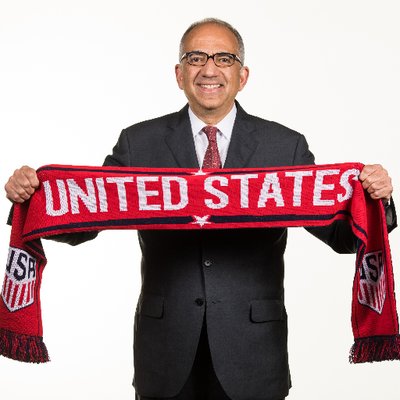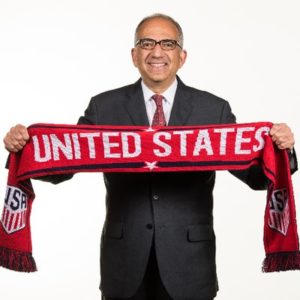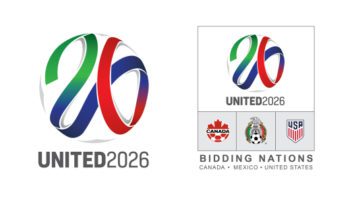
 EL BARIO, EL FALLS – In my Rain Man journeys I have come across some great people who should write for MTM. Today, I introduce Ed Crocker. Ed is the Soccer Rain Man. He so laquious that he doesn’t text he has to email his points over. Ed is pinch-hitting today and will be doing so from time to time, so everyone should be happy. With the USA failed to qualify for the 2018 World Cup and is rebuilding from that failure. I lamented that US Soccer just elected the number two guy to the president that oversaw that disaster. Ed wrote a long and brilliant argument explaining why hiring Carlos Cordeiro was not a bad idea.
EL BARIO, EL FALLS – In my Rain Man journeys I have come across some great people who should write for MTM. Today, I introduce Ed Crocker. Ed is the Soccer Rain Man. He so laquious that he doesn’t text he has to email his points over. Ed is pinch-hitting today and will be doing so from time to time, so everyone should be happy. With the USA failed to qualify for the 2018 World Cup and is rebuilding from that failure. I lamented that US Soccer just elected the number two guy to the president that oversaw that disaster. Ed wrote a long and brilliant argument explaining why hiring Carlos Cordeiro was not a bad idea.
In Defense Of Carlos Cordeiro
At the time of the election for the president of the US Soccer Federation (USSF), I supported Kyle Martino for president. But, at the time, I neglected to consider one very important variable, namely that Carlos Cordeiro had the background, experience, and skill-set to help the United Bid (Canada, Mexico and the US) win the right to host the 2026 World Cup. Cordeiro is a steady, likeable, cosmopolitan, worldly person who speaks multiple languages, has lived in different countries and excels at interacting with people of different cultures and backgrounds. And, apparently, the US’s being awarded the 2026 World Cup (along with Mexico and Canada) was in far more jeopardy than many us, including me, had realized at the time of the 2018 election for president of the USSF. Here is the link.
Once elected president of the USSF, Cordeiro led an excellent campaign to try to increase the United Bid’s chances of being awarded the 2026 World Cup. He even had a number of top officials and staff members set up a base camp in London, deeming it a better and more efficient way to lobby soccer federations that were undecided on whether to vote for the United Bid or Morocco’s bid. London was geographically closer to many of the voters that we needed to persuade in order to win. Here is a link to an article in The New York Times by Tariq Panja and Andrew Das on Cordeiro’s well-designed and well-executed campaign to help the United Bid be awarded the 2026 World Cup.
 In addition, Cordeiro had another element of his strategy. He argued to voters that if neighboring countries such as the US, Mexico and Canada can come together to co-host a successful World Cup, then, in the future, other neighboring countries should be able to do so. Multiple countries co-hosting the event could make the financial burden on each country less onerous than it tends to be if only one country hosts the event and could also bring countries together so that they understand each other better and cooperate more. Recently, the US, Mexico and Canada have had some differences, partly because of problematic decisions made by the US’s current presidential administration. Maybe our three countries co-hosting the 2026 World Cup will help us work together more constructively in other ways.
In addition, Cordeiro had another element of his strategy. He argued to voters that if neighboring countries such as the US, Mexico and Canada can come together to co-host a successful World Cup, then, in the future, other neighboring countries should be able to do so. Multiple countries co-hosting the event could make the financial burden on each country less onerous than it tends to be if only one country hosts the event and could also bring countries together so that they understand each other better and cooperate more. Recently, the US, Mexico and Canada have had some differences, partly because of problematic decisions made by the US’s current presidential administration. Maybe our three countries co-hosting the 2026 World Cup will help us work together more constructively in other ways.
Moreover, other countries may see Canada, Mexico and the US co-host a successful 2026 World Cup and say: “If Japan and South Korea can co-host a successful 2002 World Cup, and Canada, Mexico and the US can do so in 2026, maybe we can do so with other countries in the future.” For instance, maybe England, Ireland, Scotland, Northern Ireland and Wales could co-host a World Cup. Maybe Morocco and Spain could do so. Maybe France and England could. Maybe Nigeria and Ghana. Maybe Ethiopia and Eritrea. Maybe North Korea and South Korea can continue to unify and one day host a World Cup. Maybe India and Pakistan could co-host a World Cup. Maybe Iran and Iraq could someday. Maybe even Israel and Palestine could do so one day.
Here is a link to an interview that Cordeiro gave to BeIn Sports Tancredi Palmeri in which Cordeiro talked about how he made the case to prospective voters that if the United Bid is awarded the 2026 World Cup and hosts a successful World Cup, it could set a good precedent in which other neighboring nations could co-host World Cups:
Robert Contiguglia, the former president of the US Soccer Federation and a recent inductee into the National Soccer Hall of Fame, supported Cordeiro’s candidacy for presidency of the US Soccer Federation. I wouldn’t be surprised if, in deciding for whom to vote for the president of the USSF, Contiguglia weighed Cordeiro’s ability to help the United Bid win the right to host the 2026 World Cup.
 Moreover, so far Cordeiro has proven to be good at discussing some of the weaknesses of the USSF and of soccer in the United States. For instance, in an article by ESPN’s Sam Borden, Cordeiro talked about how we have neglected to attract and develop enough players and fans from less privileged backgrounds and how it’s important that we do a better job of doing so. According to Cordeiro,
Moreover, so far Cordeiro has proven to be good at discussing some of the weaknesses of the USSF and of soccer in the United States. For instance, in an article by ESPN’s Sam Borden, Cordeiro talked about how we have neglected to attract and develop enough players and fans from less privileged backgrounds and how it’s important that we do a better job of doing so. According to Cordeiro,
I make the argument that we are a vast, powerful, wealthy nation, but we have haves and have-nots, and our disenfranchised are underserved, and in many ways these are the people with whom the sport resonates most. If we can bring them into the game, we’ll go from 4 million to 12 million participants. Every little kid who is 10 years old and says, ‘I want to play in that World Cup 10 years from now’—well, why can’t they??
In addition, in an article by Street and Smith’s Sports Business Journal’s Ian Thomas, Cordeiro said: “The No. 1 issue is in the grassroots, and that we’re not capturing enough of the potential of the group.” According to Cordeiro, beyond the roughly 3 million registered youth soccer players in the U.S., there might be three to four times that amount playing in unaffiliated programs or that would play if they could afford it. Said Cordeiro:
How do you bring in those kids who are from some of the most disadvantaged communities? This is a problem that has been festering for more than a decade if not longer, has been growing even more rapidly as it generally is the immigrant populations that are growing the fastest, so every year it compounds, and it gets bigger and bigger. If we don’t fix that, we won’t ever achieve our maximum potential.?
Added Cordeiro: “If I was growing up today, my single mother, being a widow and taking care of four kids, wouldn’t have been able to put any of us into soccer.” Here is a link.
Moreover, after the United Bid was awarded the 2026 World Cup, US soccer legend Cobi Jones, in an interview with The New York Post’s Brian Lewis, said:
The legacy of the ’94 World Cup, MLS came out of it. Twenty-odd years later everything has come through that World Cup. In 2026 the dollars will be more, more attention, impact. Interest will pick up in the sport, [giving] an opportunity for kids in underserved communities to pick up as the money flows into it, and enjoy and play this game. Tapping into ’94, nobody expected [MLS] to be where it is now. I’m excited to see what the possibilities are.
The onus will be on the powers-that-be to make sure the money and attention flows to those underserved communities, the money trickles down and is invested in the right ways. To be frank, we’re investing in our soccer future…It’s more players into the pot, which is beneficial not just for soccer and MLS but society. I’m a proponent of sport being beneficial in learning skills in life: Why not soccer??
In addition, when FIFA announced that the United Bid had been awarded the right to host the 2026 World Cup, Cordeiro issued a statement on twitter in which he emphasized the importance of the US’s using the 2026 World Cup as an occasion to attract more underserved kids and families in the US to be involved with the sport of soccer. According to Cordeiro,
We have made it a priority to bring the World Cup back to the United States because it will be one of the best ways to transform soccer in America—not only during the tournament itself, but over the next eight years leading up to the kickoff as sell as the years that follow. And you—our members at every level—will be a critical part of this journey as we work together to take soccer in our country to new heights.
The excitement around 2026 will inspire a new generation of youth and adults and bring more players into our ranks, especially from underserved and immigrant communities from other soccer-loving nations. Across our country, there are young, aspiring players who can now dream of watching—and maybe even competing in—a World Cup on American soil in eight years.
Bringing the most important soccer event in the world to North America will also help generate new revenue that we can invest to make soccer more affordable and develop the very best players, coaches and referees at all levels. It will attract even more fans, whose passion is helping to fuel the phenomenal growth of soccer across America.
In short, the tremendous energy and resources around 2026—the first World Cup in the US in the digital age—will be a once-in-a-generation opportunity to bring us closer to our goal of making soccer the preeminent sport of America. I know we can do it!
Winning our bid is also part of a new phase of US Soccer. As I discussed with Grant Wahl of Sports Illustrated on his Planet Football podcast, we’re laying the foundation for the future. And just as we were relentless in the pursuit of our bid, we’ll be relentless in our work to grow soccer in America, especially at the grassroots.
As always, I’m honored to be on this journey with you, and I could not be more excited about the road ahead.
Carlos?
Here is a link:
My latest letter to our soccer family: why bringing the FIFA World Cup to the USA in 2026 is so important. It’s part of our mission to transform soccer in America and inspire the next generation of players! #OneNationOneTeam #United2026 pic.twitter.com/G8QGkR6cBn
— Carlos Cordeiro (@CACSoccer) June 22, 2018
Leave your thoughts below and come back tomorrow for another gem by The normal Rain Man. You can also find us on Twitter – @JunoirBlaber, @MeetTheMatts & @Matt_McCarthy00, Instagram – @MeetTheMatts – and Facebook – Meet The Matts
P.s… Watch or listen to this new show with Short Matt and Danny B. They are looking for honest feedback at @SportsGotcha and this may be away us MTM pundits make some change…

